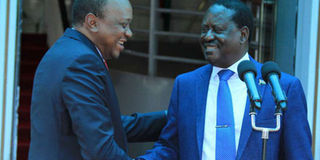Referendum push, 2022 poll cause leaders headache

President Uhuru Kenyatta (left) and opposition leader Raila Odinga conclude a joint press conference at Harambee House, Nairobi, on March 9, 2018 where they agreed to foster unity. PHOTO | JEFF ANGOTE | NATION MEDIA GROUP
What you need to know:
- President Kenyatta has kept a studious silence as his followers seek direction on the political import of the March 9 handshake.
- Kirinyaga Senator Charles Kirubi said there are gaps in the Constitution, especially on representation, that needed to be addressed.
The political tremors from President Uhuru Kenyatta and opposition leader Raila Odinga’s handshake have intensified, causing deep divisions in Central Kenya and the Rift Valley, which Deputy President William Ruto is banking on to ascend to the presidency.
Kanu is led by Baringo Senator Gideon Moi, the presumed threat to Mr Ruto’s following in the Rift Valley.
So when its secretary-general Nick Salat said Mr Ruto’s reliance on elected Central Kenya leaders could backfire, it was interpreted in some quarters to mean Kanu was working with other leaders in Central to tilt the ballot there in favour of Mr Moi.
POLITICAL DEBT
Adding traction to that view was a subtle message from some Mount Kenya leaders that they conditionally support the referendum, a tussle that pits Mr Raila for, and Mr Ruto against.
“We should let the people of Central to be free to make their choices in 2022. Hakuna deni (There is no debt) to be paid by anyone.
"As much as they want to press for it, it would be gullible to believe that the current group of Central leaders will deliver the seat for him.
"Eighty per cent of them will be voted out,” Mr Salat said during an interview with Citizen TV on Thursday.
The debt he spoke of is the understanding publicised in 2013 and 2017 election campaigns that President Kenyatta would lead Central in supporting Mr Ruto come 2022 in appreciation of him mobilising the Rift Valley to vote for Mr Kenyatta in the previous two elections.
With that brickbat, Mr Salat could as well have been addressing the President.
REFERENDUM
President Kenyatta has kept a studious silence as his followers seek direction on the political import of the March 9 handshake, whose agenda to unify the country Mr Odinga believes can be realised only by changing the Constitution.
Mr Ruto and his followers read in this a scheme to upset the applecart, and have loudly made tough statements this week, emboldened by President Kenyatta saying a referendum would distract from his “Big Four” agenda, a plan to see more people in decent and affordable shelter, create more jobs through industrialisation, ensure healthcare and food security for all.
Whether that amounted to his ruling out his support for, or tactfully pouring cold water on the referendum for now, depends which side of the political divide one is on.
This has left many Central Kenya leaders walking a tightrope between supporting Mr Odinga’s push to have the Constitution changed to make the country’s governance more inclusive through a Parliamentary system, and remaining solidly behind the President and his deputy.
DEVELOPMENT
Gatundu South MP Moses Kuria, his Kiharu and Mathira counterparts Ndindi Nyoro and Rigathi Gachagua, respectively, are among those opposed to a referendum.
Mr Kuria on Thursday said he does not support the idea because it will benefit only a few people.
He said the country needs to focus more on development and uniting Kenyans by developing road infrastructure and institutions that ease the lives of the local citizens.
“No work will be done if there is a referendum. We will be out there politicking and calling each other names, but we had enough of that last year,” he said during the official opening of a six-classroom tuition block at the Kenya Medical Training College (KMTC) Gatundu Campus.
FINANCE
Meanwhile, Mr Gachagua said a referendum would be a financial drain, with the country having come from two difficult elections last year.
“Kenyans are yet to recover from the poll fatigue. If they have issues that they feel should be decided on, there are other public participation avenues for that,” he said.
And Mr Nyoro said: “It is not possible to have an all-inclusive government. Anyone who is hoping that the changes in the Constitution will result in new positions is a detractor.”
He added that the referendum should not feature in discussions on healing the country.
Those in the middle back the reforms, but with caveats: Focus should be on devolution, representation, land and other issues, not the executive; they should not be done before 2022 but if they are, they should be implemented after the next General election.
This is borne of the belief that the changes are meant to accommodate Mr Odinga in the Executive.
REPRESENTATION
Kirinyaga Senator Charles Kirubi said there are gaps in the Constitution, especially on representation, that needed to be addressed.
"An MP representing 200 people should not have the same power as someone representing 5,000 constituents. But these issues are not do or die, they can wait as we focus on growing the economy,” Mr Kirubi said.
But former Runyenjes MP Njeru Kathangu backed a referendum focused on addressing issues relating to provisions on land, the right to life and Kadhi courts.
“A referendum should be address the lacuna and do what is good for the people and be delinked from personalities,” Mr Kathangu, who participated in the 2010 constitutional review, said.





